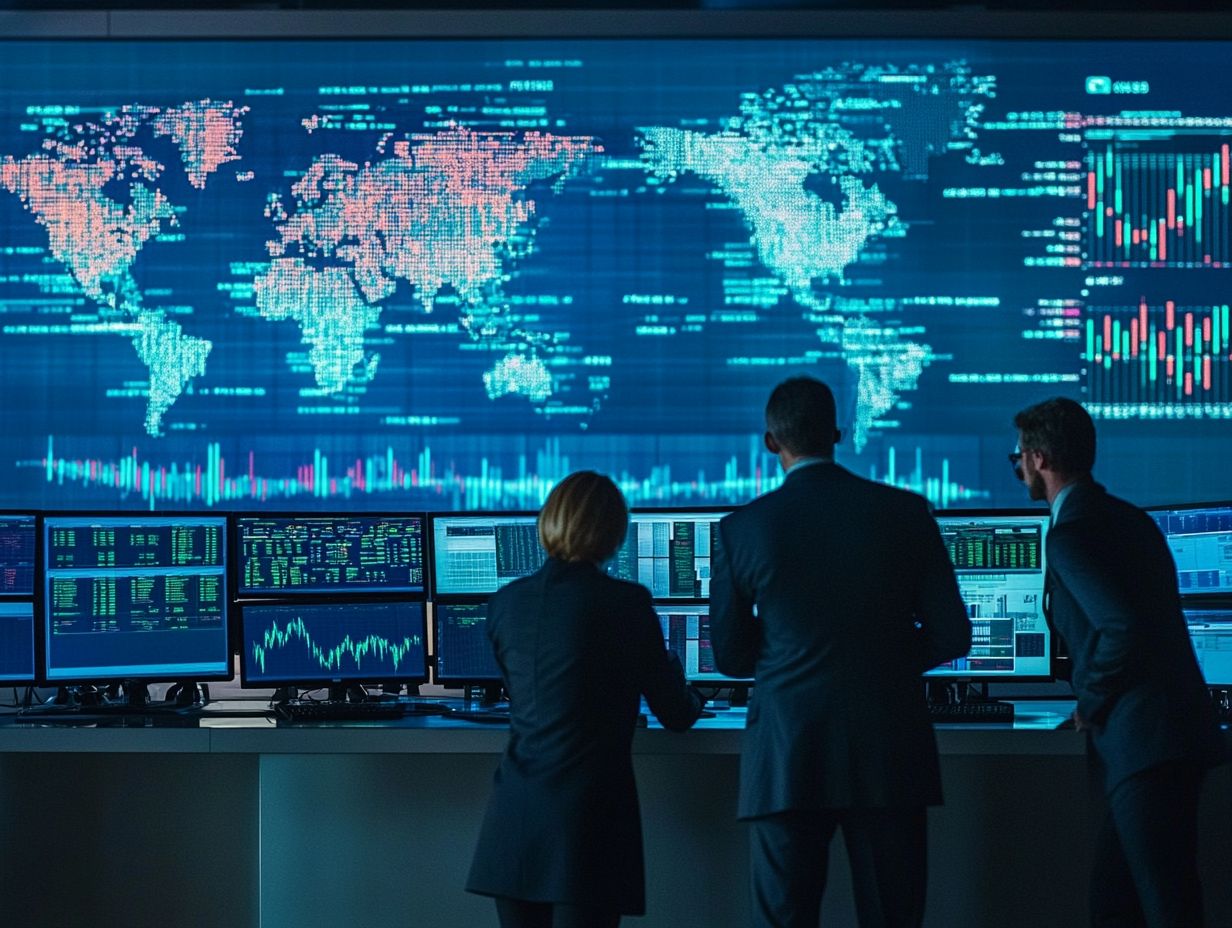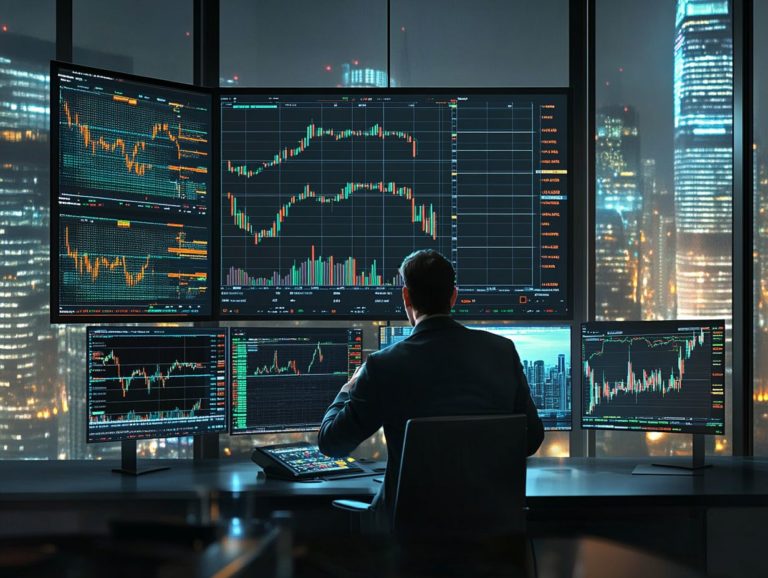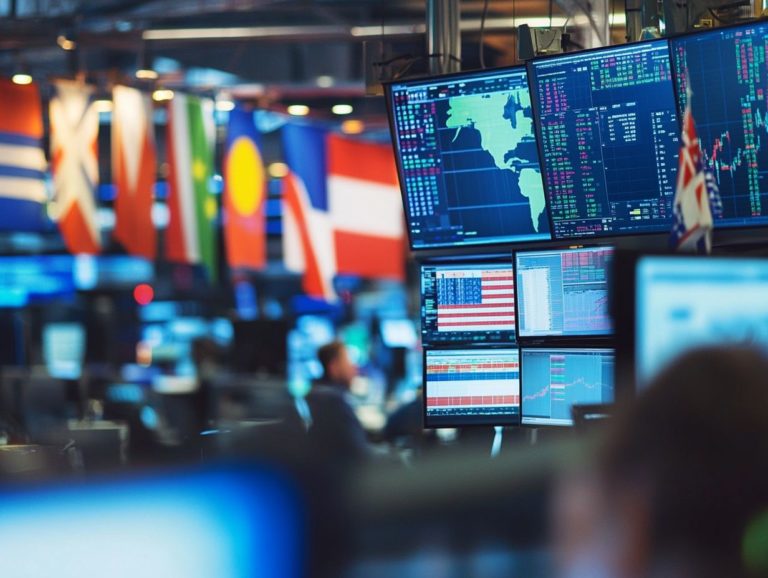The Influence of Global Events on Stock Trends
In today’s fast-paced financial world, understanding how global events sway stock trends is vital! Let s uncover these powerful influences together.
Political upheavals, economic fluctuations, natural disasters, and social movements are just a few factors that can significantly affect market performance.
This article explores how global events connect with stock trends. You will find helpful examples and insights on how they impact investor behavior.
You will discover tools and strategies that can help you predict stock movements in response to global happenings, ensuring you are well-equipped to navigate this dynamic environment.
Together, let s unravel the layers of complexity that define the intersection of global events and stock market trends.
Contents
- Key Takeaways:
- Impact of Political Events on Stock Trends
- Influence of Economic Events on Stock Trends
- Role of Natural Disasters in Stock Trends
- Other Factors that Affect Stock Trends
- Technological Advancements and Social Movements
- Influence on Stock Market Volatility
- Predicting Stock Trends during Global Events
- Frequently Asked Questions
- What are some examples of global events that can influence stock trends?
- How do global events impact stock trends?
- Are all global events equally influential on stock trends?
- How do investors react to global events?
- Is it possible to predict the impact of global events on stock trends?
- How long do the effects of global events on stock trends typically last?
Key Takeaways:

- Political events can have a significant impact on stock trends, as seen in examples such as elections and trade wars.
- Economic events also play a crucial role in stock markets, with factors such as interest rates and inflation affecting stock trends.
- Natural disasters can have unexpected effects on stock trends, highlighting the importance of analyzing and predicting their impact on the market.
Defining Key Terms
Understanding the key terms that define the global financial markets is crucial for you as an investor or analyst. These concepts provide a framework for understanding how countries manage their economies.
For example, global factors like geopolitical tensions or trade agreements can significantly shift international capital flows, impacting how emerging markets attract investments. In advanced economies, policy shifts from major entities like the US Federal Reserve often lead to fluctuations in liquidity measures, reflecting the overall health of the economy.
By examining stock market volatility, you gain insights into investor sentiment while also uncovering the risks tied to global interest rate changes. This illustrates the delicate balance that governs financial activities across both mature and developing nations.
Impact of Political Events on Stock Trends
Political events wield a significant influence over stock trends, shaping investor sentiment and guiding capital flows throughout global financial markets. Shifts in government policies, rising geopolitical tensions, and pivotal elections can trigger immediate volatility in the stock market, especially in emerging economies, where the impact of political instability is particularly pronounced.
Grasping these dynamics is crucial for you as an investor seeking to adeptly navigate the intricate interplay of political factors and their effects on market stability and performance.
Examples of Political Events and Their Effects
Several political events have historically shaped stock trends, especially in emerging market economies, where the impact can be pronounced and far-reaching. From government overthrows to significant policy shifts, these events introduce risk factors that can lead to dramatic fluctuations in stock market performance, underscoring the necessity of monitoring political developments around the globe.
Take, for example, the 2019 election in South Africa. This event not only determined the country’s leadership but also signaled economic reforms aimed at boosting investor confidence, resulting in a notable uptick in local stocks. On the other hand, the imposition of economic sanctions on Russia, driven by geopolitical tensions, triggered substantial declines in the Russian stock market, leading to a cascade of capital outflows and a shallow market depth.
These occurrences illustrate how political dynamics can transform capital flows, with investors frequently retreating or advancing based on their perceptions of stability and geopolitical risk. For you as an investor navigating an increasingly interconnected global market, understanding these correlations is not just beneficial; it’s crucial.
Stay ahead of the game by keeping an eye on global events and their impact on stock trends!
Influence of Economic Events on Stock Trends

Economic events significantly influence stock trends, affecting everything from investor confidence to the flow of capital across international markets. When global interest rates shift often due to a policy where the central bank increases money supply to stimulate the economy from entities such as the US Federal Reserve changes in market dynamics can impact stock performance in both developed and emerging economies.
Understanding these economic indicators is essential for crafting successful investment strategies.
How Economic Factors Affect Stock Markets
Economic factors like liquidity and financial market exchange rates play a significant role in shaping stock markets worldwide. When these indicators fluctuate, they can stir up stock market volatility, influencing investor behavior and capital flows.
This is especially true in emerging markets, where effects are often amplified. For example, when interest rates rise, borrowing costs increase, deterring both corporate investment and consumer spending. This ultimately leads to reduced earnings forecasts, particularly pronounced in countries like Brazil with high inflation rates.
In contrast, Thailand enjoys a stable interest environment and controlled inflation. Such conditions have historically fostered gradual market growth and attracted foreign investment, enhancing liquidity in the stock market.
Understanding these dynamics empowers you to make smart investment choices in the complex landscape of financial stability and economic health.
Role of Natural Disasters in Stock Trends
Natural disasters can significantly influence stock trends, especially in vulnerable emerging markets. Events like earthquakes, floods, and hurricanes disrupt economic activity, resulting in increased volatility and uncertainty.
This volatility can erode investor confidence and affect capital flows. For you as an investor, grasping the connection between natural disasters and market stability is crucial for navigating these unpredictable events. How prepared are you for such market shifts?
Analyzing the Effects of Natural Disasters on Stocks
Examining the effects of natural disasters on stocks reveals a fascinating interplay between immediate market reactions and long-term economic recovery. Often, stock performance takes a hit right after such events due to risk factors like insurance liabilities and liquidity issues.
Take Hurricane Katrina, for example. Following the disaster, various sectors experienced significant declines, especially tourism and insurance companies. Research shows that the S&P 500’s average return fell by around 6% in the month following the catastrophe. However, as recovery efforts progressed and liquidity improved, many stocks rebounded over the next few quarters, showcasing the resilience of certain industries.
This highlights the critical importance of liquidity in stabilizing markets after a disaster. It acts as a lifeline for investors navigating the uncertainty that follows natural calamities.
Other Factors that Affect Stock Trends

In addition to political, economic, and environmental factors, technological advancements and social movements also play a significant role in shaping stock trends. Rapid technological evolution can lead to shifts in capital flows, directly influencing investor behavior and the overall performance of financial markets.
Meanwhile, social movements can alter corporate reputations and market dynamics. Understanding these connections is essential for navigating the complexities of the investment landscape.
Technological Advancements and Social Movements
Influence on Stock Market Volatility
Technological advancements and social movements significantly influence stock market volatility, especially in emerging markets. Change unfolds at a breakneck pace, creating opportunities and risks for investors.
For example, the rise of fintech in countries like India has transformed banking and investment access, enabling more people to engage with stock markets. However, the growing focus on sustainability championed by movements for environmental awareness has compelled companies in sectors like energy and manufacturing to adapt. This shift can lead to surges and declines in stock values, illustrating the risks involved.
Social media campaigns can quickly alter public sentiment. Stocks of companies that don t resonate with consumers may become vulnerable to volatility. While these factors can unlock growth potential, they also introduce uncertainties that investors must navigate carefully.
Predicting Stock Trends during Global Events
Predicting stock trends during global events is crucial for investors aiming to navigate market volatility and seize emerging opportunities.
By using special forecasting tools and understanding capital flows, investors can uncover valuable insights into market dynamics during uncertain times. This knowledge helps in making informed decisions amid the ever-changing global landscape.
Tools and Strategies for Forecasting Stock Trends
Effective tools and strategies for forecasting stock trends are essential for investors seeking market stability. Analyzing key economic indicators and using quantitative approaches can lead to informed predictions about future stock movements.
Market analysis software, like Bloomberg Terminal or Morningstar Direct, provides real-time data and in-depth research capabilities. Economic indicator reports, such as unemployment rates and consumer confidence indices, offer deeper insights into market health, helping anticipate shifts in stock performance.
Employing strategies like diversification and trend-following allows investors to balance risk while capitalizing on potential gains. Understanding how these tools interact with broader economic conditions enhances the decision-making process, supporting a more strategic approach to investing.
Frequently Asked Questions

Here are some essential questions that investors often have about global events and stock trends:
What are some examples of global events that can influence stock trends?
Examples include natural disasters, political elections, trade agreements, and economic crises.
How do global events impact stock trends?
Global events can cause fluctuations in market sentiment, affecting stock prices. They may also directly impact specific industries or companies, leading to changes in their stock performance.
Are all global events equally influential on stock trends?
No, some events have a larger impact than others. For instance, a major political event, such as a presidential election, may significantly affect stock markets compared to a smaller trade agreement between two countries.
How do investors react to global events?
Investors may respond by buying or selling stocks based on their perception of how the event will impact the market. They might also adjust their portfolios to minimize risk or take advantage of potential opportunities.
Is it possible to predict the impact of global events on stock trends?
Predicting the exact impact is challenging due to many variables. However, analyzing past market reactions to similar events and staying updated on current events can help investors make informed decisions.
Stay informed and make the best investment choices!
How long do the effects of global events on stock trends typically last?
The duration of global events’ impacts on stock trends can vary significantly. Some events may affect the market for a short time, while others can lead to lasting changes.
The overall impact depends on the event’s severity and how the market reacts. Understanding these factors can help investors navigate the ups and downs of stock trends.






